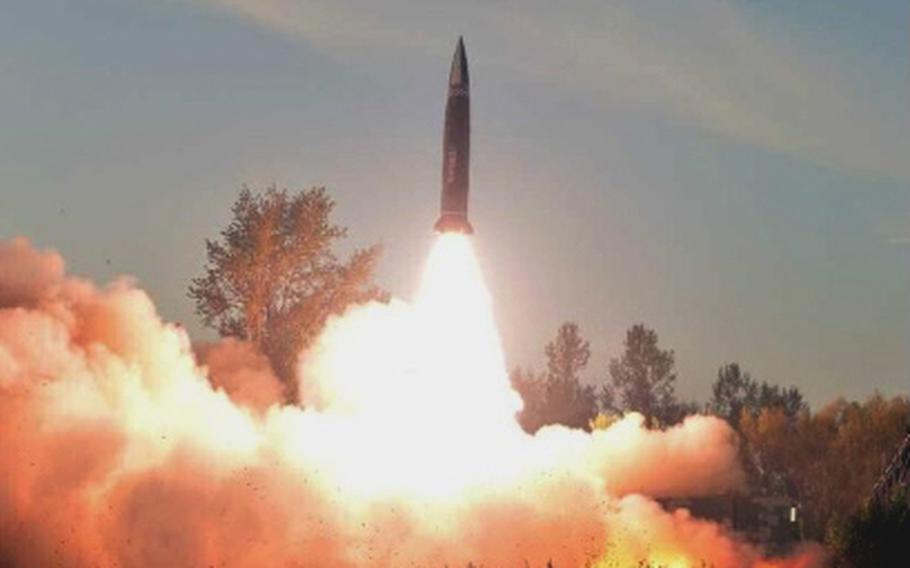
A North Korean missile takes flight in this undated photograph from the Korean Central News Agency. (KCNA)
CAMP HUMPHREYS, South Korea — North Korea fired two short-range ballistic missiles from its eastern coast toward the East Sea, or Sea of Japan, South Korea’s military said Friday.
The missiles were launched from North Korea’s eastern Kangwon province at 11:59 a.m. and 12:18 p.m. Friday, according to a message to reporters from the South Korean Joint Chiefs of Staff. The Joint Chiefs estimated the missiles flew 143 miles at a peak altitude of 15 miles.
"Our troops are currently maintaining a full readiness posture and strengthened surveillance and heightened security, working closely together with the U.S.," the Joint Chiefs said.
The U.S. Indo-Pacific Command in a news release said it is consulting with allies in the region about the launches.
"While we have assessed that this event does not pose an immediate threat to U.S. personnel or territory, or to our allies, the missile launches highlight the destabilizing impact of the [North Korea's] unlawful [weapons of mass destruction] and ballistic missile programs," the release said Friday. "The U.S. commitments to the defense of the [South Korea] and Japan remain ironclad."
The communist regime has test launched more than 40 missiles so far this year, an annual record. It last fired a missile and over 100 artillery rounds on Oct. 14. A North Korean missile soared over Aomori prefecture in northern Japan on Oct. 4.
North Korea’s latest launch comes weeks after U.S. and South Korean forces conducted a series of joint military exercises. Naval forces from the two countries drilled in anti-submarine warfare in September, preceded by the large-scale Ulchi Freedom Shield command-post exercise that was restarted after a five-year pause.
On Monday, around 240 aircraft and thousands of troops from the U.S. and South Korean militaries are scheduled to begin a five-day, large-scale air exercise. Around 1,600 sorties will be conducted by a multitude of different fighter jets, including the Marine Corps' F-35B Lightning II, according to a news release from U.S. Forces Korea.
North Korea's state-run media outlets frequently describe the U.S.-South Korean military exercises as an existential threat to its survival and justify its own missile and nuclear tests as a deterrent. U.S. and South Korean officials have said for months that North Korea is prepared to conduct its first nuclear test since 2017 and warned the regime faces severe repercussions if it does so.
"Broadly speaking, a seventh nuclear test, should it happen, would constitute a grave escalatory action and seriously threaten regional stability, international stability, security in the region and it would also undermine the global non-proliferation regime and efforts that are being undertaken," State Department spokesman Vedant Patel said in a news briefing in Washington on Wednesday.
On Tuesday, Deputy Secretary of State Wendy Sherman, First Vice Foreign Minister Cho Hyun-dong of South Korea and Vice Foreign Minister Takeo Mori of Japan met in Tokyo to reaffirm their countries' commitment in addressing North Korea's provocations.